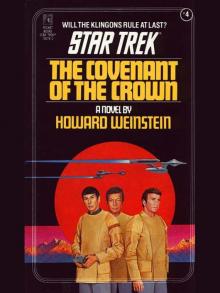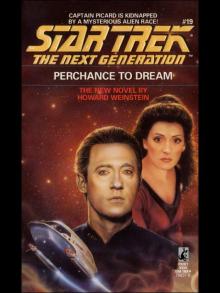- Home
- Howard Weinstein
PRECHANCE TO DREAM Page 13
PRECHANCE TO DREAM Read online
Page 13
“Thank you, Commander La Forge,” Arit said.
“You’re more than welcome, Captain.”
Arit turned to Picard. “Then you’ll be leaving now, Picard,” she said, her tone brusque.
He had not expected to be discharged quite so hastily and his eyebrows hitched up in surprise. “Actually, I had hoped our assistance might establish a bit more trust between us.”
Jevlin shouldered his way into the exchange. “I told you, Cap’n Arit—nothing comes for free.”
“With all due respect, you are wrong,” Picard said. “I said there would be no strings tied to our offer of help and I meant it. I just hoped you might be willing to tell us more about the Teniran people, and the circumstances that brought you to Domarus Four.”
“With all due respect, Picard,” Arit said with a mocking chill in her voice, “if we wish to keep our past confidential, that is our business. We have no obligation to satisfy your curiosity.”
“That’s right,” the Teniran first officer added, thumping his walking stick on the deck for emphasis. “Just leave us to our planet.”
Picard’s jaw tightened. This was not going at all the way he had envisioned. He thought they’d made some real progress during the past couple of hours, but perhaps he’d only seen what he’d wanted to see. The Tenirans obviously did not see things as he did.
“Then we are back to our unresolved conflict,” he said evenly, his tone and phrasing expressing quiet insistence—he was not going to back down. “We still have not ascertained the fate of our missing shuttlecraft, and this is not your planet for the taking. We have all witnessed the same evidence suggesting that Domarus may harbor sentient life. For your own safety, if for no other reason, I should think you would want to cooperate with us in figuring out whether or not Domarus is inhabited by—”
“By those colored energy patterns?” Jevlin said dismissively. “They’re not any evidence of anything—and you’ve got no authority to order us around. Now unless you want yourselves to be considered prisoners—”
Arit cut her first officer off with an imperious wave of her hand. “Jevlin has a nasty temper at times, Captain Picard,” she said, intentionally calm now. “You are, of course, free to go, with our thanks. But, if necessary, we will fight for our right to settle here.”
“Captain Arit, I do not believe combat to be the solution to your dilemma . . . and I don’t think you do, either. There are other alternatives.”
“For you, Picard, there may be alternatives—not for us. Here is where we choose to stay, and let me be clear about this: after all we’ve been through, we are willing to die for that choice. If the Enterprise uses force to try and stop us—”
“We will not,” Picard said. “But if there are advanced life forms on Domarus, they may perceive you as invaders. They may use force—in ways we cannot even begin to imagine.”
“If that’s the case, then it will end here after all, Picard.”
“Arit, I cannot believe—”
Before Picard could finish, before anyone could react, he and Arit were suddenly enveloped in a rush of swirling colors. An instant later, the colors vanished from the bridge as abruptly as they’d appeared, and the two captains vanished with them.
“Shields up!” Jevlin shouted. “Defensive priority!”
On the Enterprise bridge, Lieutenant Worf growled deep in his throat.
“What is it, Mr. Worf?” said Riker from the command seat, turning to face the Klingon security chief.
Worf’s brow ridges deepened into a glower. “The Teniran ship has just raised its shields, sir.”
“What the hell?” Riker said, eyes narrowing as he stood. “Raise our shields and open a channel to the Glin-Kale.”
“Shields up—channel open, Commander.”
Riker took two strides toward the viewscreen and planted his feet in a belligerent stance. “Enterprise to Glin-Kale. This is Commander Riker. You have violated our truce accord by raising your shields. Why?”
First Officer Jevlin appeared on screen, standing in the center of his bridge. The old Teniran’s eyes flicked from side to side, as if trying to keep track of chaos around him, betraying the agitation he struggled to banish from his voice. “We have our reasons,” he answered in a lame attempt at defiance.
Riker could see Geordi and his trio of engineers waiting just behind Jevlin, apparently unharmed and unrestricted. But where is the captain? Dammit—I knew I shouldn’t have let him stay over there. “Let me speak to Captain Picard.”
“That is not possible, Commander. Let me speak to Captain Arit.”
Riker’s eyes narrowed. “We don’t have your captain.”
“Then they’re both gone, gods know where.”
“Geordi—”
La Forge stepped forward. “Here, Commander.”
“Is he telling the truth?”
“I’m afraid so, sir. Same deal—that multicolored energy pattern again.”
“And until Captain Arit is returned to this ship,” Jevlin said harshly, “your engineers will stay right here in our custody. Glin-Kale out.”
Seconds after Jevlin’s determined face faded from the viewscreen, the now-familiar whorls of color and their collateral sounds filled the heart of the Enterprise bridge. Worf leaped over the railing, intent on protecting Riker more effectively than he’d been able to protect his captain a day ago.
But this time, the enigmatic energy phenomenon hadn’t come to abduct anyone. Instead, it deposited Picard and Arit near the big viewscreen, then promptly dissolved.
Picard found he was getting accustomed to these precipitous changes of venue, and he recovered his balance quickly, tugged at the hem of his tunic to straighten it, and acknowledged the gapes of his stunned bridge crew with an unruffled nod of greeting. Then he turned to the shaken Teniran commander. “Captain Arit—welcome to the Enterprise.”
For as far back as she could remember in her sixteen years, Gina Pace had never feared the unknowns lurking around the next corner or hunkered in the dark shadows just beyond her vision. As a child, she had never given this lack of fear much thought—just followed her natural curiosity to know and see what she hadn’t seen before.
But now, as she neared adulthood, new perspectives presented themselves. And she would occasionally find herself wondering why some people—like Kenny Kolker, for instance—approached the unknown so differently from the way she did, freighted with dreads and anxieties that for some reason simply didn’t intrude on her life. Not that the wondering had changed her. She still followed her nose, more or less, with unwavering faith that whatever waited around the next bend would be worth the journey—and would not kill her.
And for the present, she believed Kenny would be around the next bend in the maze of Domaran caves and tunnels. Or around the bend after that. She would find him.
She followed a tunnel that narrowed to the point where she had to crouch and scuttle to keep moving forward. The pool of light from her lantern cut the gloom and revealed a fork just ahead. She chose the left branch and was pleased to find that it opened up in both width and height, permitting her to stand. A good omen maybe . . . ?
Or maybe not. She panned her light beam ahead and saw that the tunnel dead-ended, and—
“There’s no way out this way,” said a voice in the darkness, making her heart jump with reflexive fright. “Believe me.”
Kenny’s voice!
She swept her flashlight beam across the tunnel and found him against the cave wall, huddled on a flat outcropping of rock, the fingers of one hand fanned out before his face as he tried to block out the glare of her light.
“Sorry,” she said, pointing it up like a torch.
“That’s better.” He flicked his own light on and together they provided softer illumination for the small cul de sac. “How did you find me?”
Gina shrugged. “I just did, that’s all. Are you okay?”
“Yeah, I guess so. I’m feeling a little hungry. A little tired.” His e
xpression betrayed his inner uncertainty. “A little stupid. Other than that, okay.”
She came closer to him, shaking her head. “What in the whole wide universe possessed you to pull a stunt like this?”
“It wasn’t a stunt,” he protested. But the reality of the situation drained the fight out of him. “I just thought . . . I might find a way out.”
“Oh,” she said neutrally. “Did you really do this to impress me?”
“No!” he bleated indignantly, then sighed and hung his head. “And if I did, the plan sure backfired.”
“Maybe it did . . . maybe it didn’t.”
He glanced at her from beneath his embarrassed frown. “What do you mean? I blew it. I disregarded orders—and on top of that, I got lost. How much more could I have screwed up?”
“Let me give that some thought. Not that I’m defending what you did or your obvious lack of success.”
“Great . . . kick me while I’m down.”
“I’m just saying that what you did was kind of, well . . . sweet. Stupid . . . but sweet.”
“Yeah?” he said, brightening.
“Yeah.” She managed a shy smile, then extended her hand and pulled him to his feet. “We better get back. I’m sure they’re having a fit looking for me by now, not to mention you.”
Gina’s hidden meaning dawned on him. “Huh? You mean, they don’t know you went looking for me? You did the same thing I did?”
The comparison obviously offended her. “The same as you did? Not exactly. After all, I did find you—and I’m not lost. C’mon.”
“Maybe I should return to the Glin-Kale, Jevlin . . . maybe you’re right. But I’m not ready to come back. Not yet.”
Captain Arit leaned across the conference-room table, looking at the disapproving image of her first officer on the table-top viewscreen. Picard, Riker and Dr. Crusher sat there, too, waiting.
“How do I know you’re not a prisoner, Cap’n?”
“I’m not a prisoner, any more than Picard was on our ship. But we’ve got things to discuss, and now is the time to do it.”
“But, Cap’n, our people are ready to take this Domarus Four and make it home.”
“Not without my authorization . . . and I am no longer sure that Domarus is the place for us, Jevlin.”
The Teniran first officer jumped to his feet and pounded his walking stick on the deck. “Don’t tell me you’re going along with Picard’s fantasy tales about intelligent life down on the planet.”
“Intelligent life? Who knows. But something unexplained is going on down there, and only a fool would send her people down to settle a place that could pose grave dangers. I may be a lot of things, Jevlin . . . but I am not ready to answer to ‘fool.’ ”
She saw her old friend slump back into the Glin-Kale’s command seat, subservient for the moment. “I suppose you’ll be wanting me to release these engineers then.”
“I think Captain Picard would like them back, yes. If it’s not too much trouble for you, Jevlin,” Arit said tartly.
“Our shields are being lowered now, Cap’n. They’re free to go.”
Riker activated his insignia communicator. “Riker to transporter room.”
“O’Brien here, sir,” came the intercom reply.
“Lock onto Geordi’s team and beam them back.”
“They’re as good as here, Commander. O’Brien out.”
Picard rested his clasped hands on the table. “Thank you, Captain. And I am pleased that you chose to stay and discuss the situation. The fate of your people rests in your hands—I do believe you’ve made the correct choice.”
Arit cocked a skeptical eyebrow. “That remains to be seen.”
Chapter Twelve
“I’VE NEVER SEEN anything like this network of tunnels,” Gina said as she led Ken back through the underground labyrinth. “It’s hard to believe all this formed naturally.”
“You know, I was wondering about that. Not that I have so much subterranean experience, but there seemed to be almost a system here—though I couldn’t even begin to make any sense out of it. That’s why I wasn’t too nervous when I realized I was lost.”
“You mean, you figured if there really is a system at work here, somebody would find you?”
“Pretty much.”
Gina gave him a searching look. “So you weren’t scared out here by yourself?”
“Maybe a little, at first. But it wasn’t as bad as I thought it would be. It was actually kind of peaceful, in a way. I got to thinking, wondering . . . if maybe death is something like this.”
As they bent down to crawl through a narrow stretch of the passage, she glanced at him quizzically. “You lost me on that one.”
“I mean, maybe death is like walking down a tunnel that gets more and more narrow . . . kind of cool and dark, and quiet and private.”
“But what about all those near-death or back-from-the-dead experiences people tell about—there’s always a bright light at the end of the tunnel. The only bright light here was this—” She briefly flashed her light in his eyes. “So what did you find at the end?”
“Nothing. I mean, maybe it’s like I’m still alive, so I never got to the end. Or maybe there isn’t any end.” He was quiet for a moment. “Oh, hell, I don’t know.”
“No,” Gina teased, “they say hell would have fire and brimstone.”
They emerged from the narrow confines of a branch tunnel. Gina’s calm confident stride left no doubts that she knew exactly where they were headed. “You know, you left your poetry notebook out,” she said.
“I did?”
“Aha! So it was a poem you were writing the other day.”
“So?” His tone was plainly defensive.
“So, nothing.”
“Did you read any of it?” he asked, steeling himself for a barrage of ridicule.
“No. I found it in the cockpit.” She paused. “And I put it away with the rest of your stuff.”
Now Kenny seemed insulted. “You mean you didn’t read it? Why not?”
“You seemed to want to keep it private. So I respected that. Not that I wasn’t curious . . . I mean, you don’t seem like the poetry-writing type,” she said as they sidestepped a pool a few inches deep, fed by water that trickled down the tunnel wall and collected in a shallow depression.
“Well, I wasn’t. But I once did a computer project analyzing the symmetry of rhymes.”
Gina seemed to regard that to be a tenuous link at best. “And that’s how you started writing poems?”
“Yeah. What’s so strange about that? Don’t you think there’s a lot of art in science and science in art?”
“I don’t know. I never really thought about it that way.” She was a little surprised to hear something that thought provoking out of Kenny. Maybe there’s more to him than I thought . . . “Tell me something.”
“What?”
“Why don’t you want anyone to know you write poetry?”
“I don’t know,” he said with a short shrug. “You said it yourself—people just don’t look at me and think ‘Ah, he’s a poet!’ ”
“Y’know, I’ve liked to draw and paint ever since I can remember. But when I was little, I’d do it in secret, in my room with the door shut. When I started school, I wouldn’t do art when all the other kids did.”
“Really?”
“Mm-hmm. No matter how my teacher tried, she just couldn’t get me to draw in class. I was one stubborn little kid, and I just didn’t want anyone to see my stuff.”
Ken gave her a quizzical look. “Why not?”
“I don’t really know. For some reason, I just got it in my head that these drawings were mine, something private. Not something to be shared.”
“What made you change your mind?”
Gina smiled. “My grandma. She found one of my paintings. It was a picture of the mountains outside our town. You know how other people put their kids’ art up in the kitchen or someplace like that?”
“Yeah.”
“Well, my grandma had this painting framed in this gorgeous antique wooden frame . . . and she made a big deal of telling me that she loved the painting so much that she was going to hang it in her bedroom, next to her bed, so it would be the last thing she’d see when she went to sleep at night, and the first thing she’d see when she got up in the morning. And she made me promise to show all my pictures to her. And that’s when I knew that whatever else I did, I’d always want to be an artist.”
“That’s a nice story, Gina.”
“Yeah.” She looked him straight in the eye. “If people don’t see you as a poet, maybe that’s because you won’t let them. Maybe you should change that.”
“Picard, you said yourself that you’ve detected nothing down there that could be called sentient life,” Arit insisted as she paced around the curved table in the Enterprise conference room, circling behind the captain, Riker and Dr. Crusher.
Picard peered calmly over his steepled fingers. “Not conclusively, perhaps. But the indirect evidence does seem to point in that direction. Would you disagree with that?”
Arit stopped and gripped the headrest of her chair. “All I will agree to is that some force we don’t understand appears to be present on the planet and in the orbital vicinity of Domarus. Nothing more, nothing less.”
“With all due respect, Captain Arit,” said Riker, “you sound like a lawyer.”
She fixed Riker with a measured look. “Maybe that’s because I have to defend my people’s right to settle on an uninhabited planet that seems to belong to no one, and that no one but you seems to care about.”
Picard shook his head. “Captain, no one is prosecuting you. And this contentiousness is getting us nowhere—” The rolling beep of the intercom interrupted him, followed by Engineer La Forge’s voice over the speaker.
“La Forge to Captain Picard.”
“Picard here. Have you completed that cumulative evaluation of our sensor readings?”

 V06 - Prisoners and Pawns
V06 - Prisoners and Pawns THE COVENANT OF THE CROWN
THE COVENANT OF THE CROWN POWER HUNGRY
POWER HUNGRY PRECHANCE TO DREAM
PRECHANCE TO DREAM Perchance to Dream
Perchance to Dream